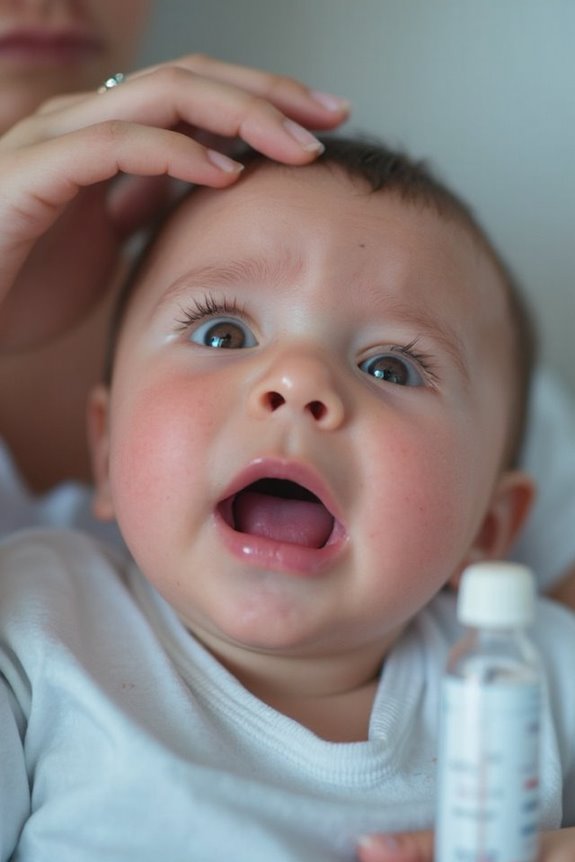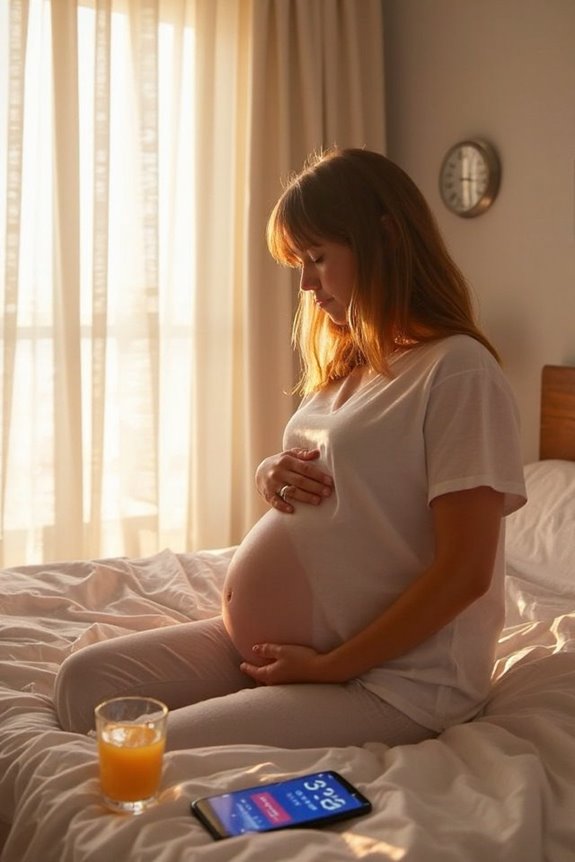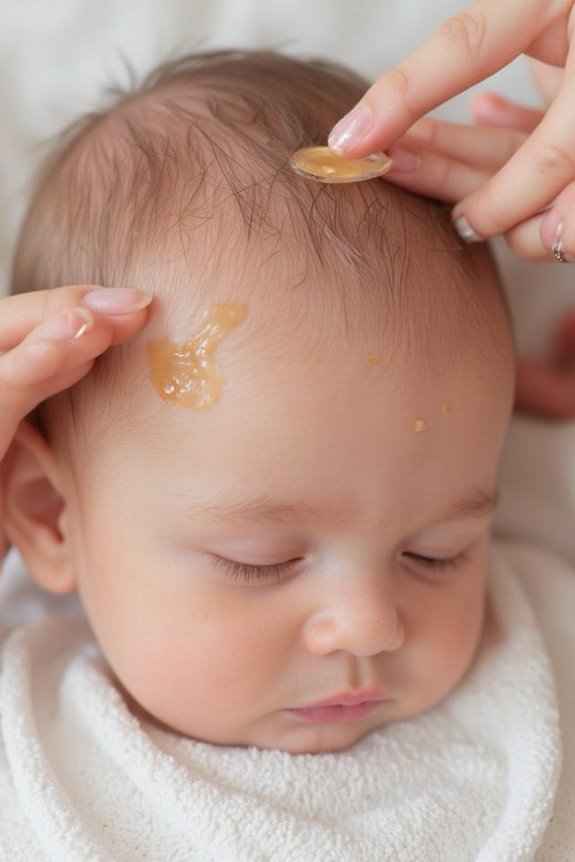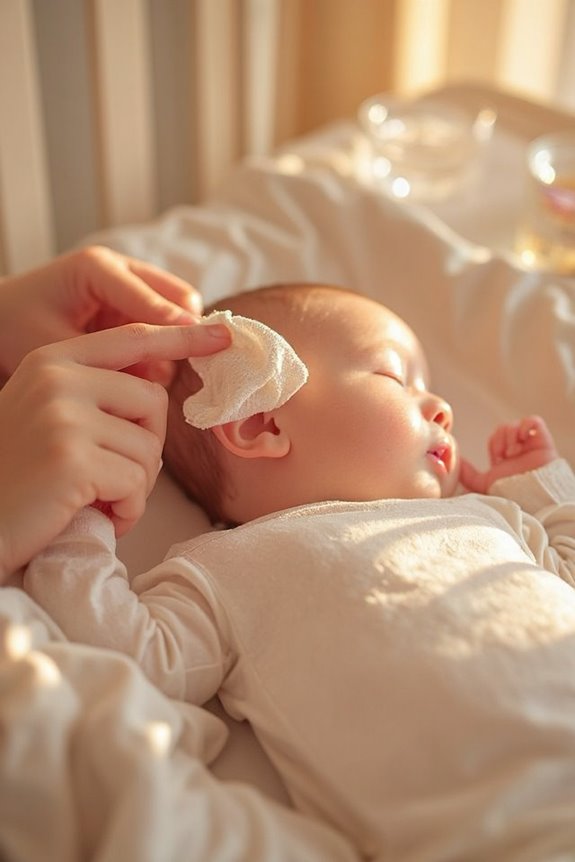Yes, babies can get strep throat, though it’s rare in infants under 1 year old. Strep throat is a bacterial infection caused by group A Streptococcus that primarily affects children aged 5-15. In babies, symptoms may include high fever, irritability, refusing to feed, and thick nasal discharge rather than the typical sore throat complaints. Diagnosis requires a throat swab, and treatment involves antibiotics. Understanding the unique presentation in infants helps parents recognize when medical attention is necessary.
Key Takeaways
- Babies under 1 year can get strep throat, but it’s rare compared to children aged 5-15.
- Infants typically show milder symptoms like fever, irritability, and feeding refusal rather than the classic sore throat.
- Diagnosis requires throat swabs or cultures since symptoms in babies often resemble viral infections.
- Treatment involves antibiotics like amoxicillin, with full course completion essential to prevent complications.
- Recent studies show an increase in invasive Group A Streptococcus infections in infants, particularly since late 2022.
What Is Strep Throat and What Causes It?
Strep throat, medically known as streptococcal pharyngitis, is a bacterial infection that affects the throat and tonsils. As part of a thorough strep throat overview, it’s important to understand that this condition is specifically caused by the Streptococcus pyogenes bacterium, also called group A Streptococcus.
This bacterial infection spreads easily through:
- Respiratory droplets when an infected person coughs or sneezes
- Direct contact with someone who has strep throat
- Sharing items like cups, utensils, or towels
The bacteria can live in a person’s nose and throat without causing symptoms, but when it becomes active, it leads to painful inflammation. While there are over 120 strains of group A Streptococcus, they all cause similar symptoms when they trigger strep throat.
How Common Is Strep Throat in Babies Under 1 Year?
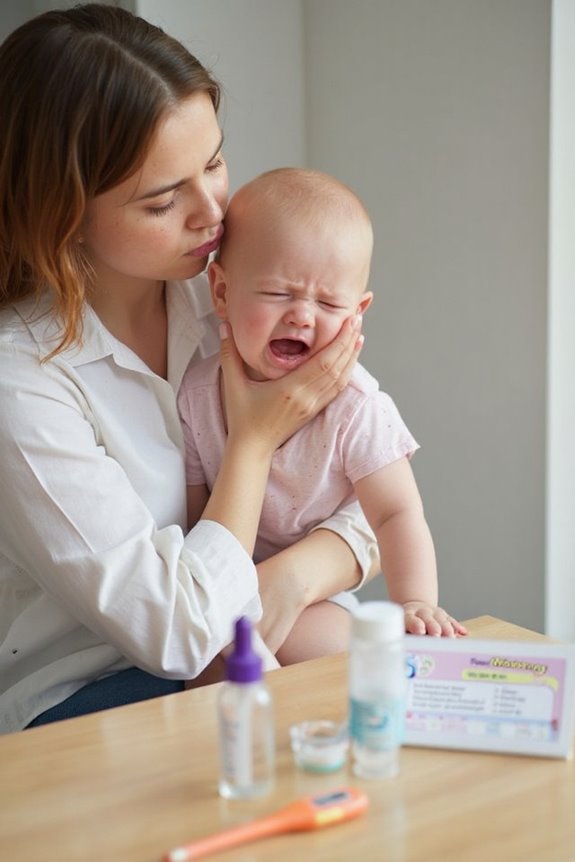
While many parents worry about bacterial infections in their little ones, the good news is that strep throat is actually quite rare in babies under 1 year of age. When examining strep prevalence across different age groups, the data consistently shows that Group A Streptococcus (GAS) infections primarily affect children between 5 and 15 years old.
The rarity of strep throat in infants under 12 months is well-documented in infant health research. When babies do contract strep throat, they typically display milder symptoms than older children. However, it is crucial to recognize that while standard strep throat is uncommon in babies, invasive GAS (iGAS) infections have shown concerning increases in this age group, particularly in late 2022.
Recognizing Strep Throat Symptoms in Infants and Toddlers
How can you tell if your baby has strep throat when they can’t tell you what hurts? Symptom recognition requires careful observation of both physical signs and infant behavior changes.
Watch for:
- High fever above 100.4°F
- Red, swollen throat (sometimes with white patches)
- Swollen lymph nodes in the neck
- Unusual irritability or fussiness
- Refusal to feed or painful swallowing
Your baby may also show:
- Thickened nasal discharge
- Disturbed sleep patterns
- Lethargy or general discomfort
- Fine red rash (in some cases)
Seek medical attention immediately if your baby has a prolonged fever lasting over 24 hours, severe irritability, signs of dehydration, or difficulty breathing. These symptoms require professional evaluation, especially when they persist or worsen after 48 hours.
Differences Between Strep Throat and Viral Infections in Babies
Distinguishing between strep throat and viral infections in babies isn’t always straightforward, but it’s essential for proper treatment.
The key differences include:
- Symptom onset: Strep throat symptoms appear suddenly, while viral infections develop more gradually
- Associated symptoms: Viral infections often come with coughing and runny nose, which aren’t typical with strep
- Appearance: Strep may cause white spots on tonsils and swollen lymph nodes
- Treatment needs: Strep requires antibiotics, while viral infections don’t
Throat discomfort in babies presents differently than in older children. They may refuse to eat or drink due to pain rather than verbally complain. Remember that infants rarely get strep throat, making viral infections a more likely cause of their symptoms.
When to Call Your Pediatrician About Possible Strep
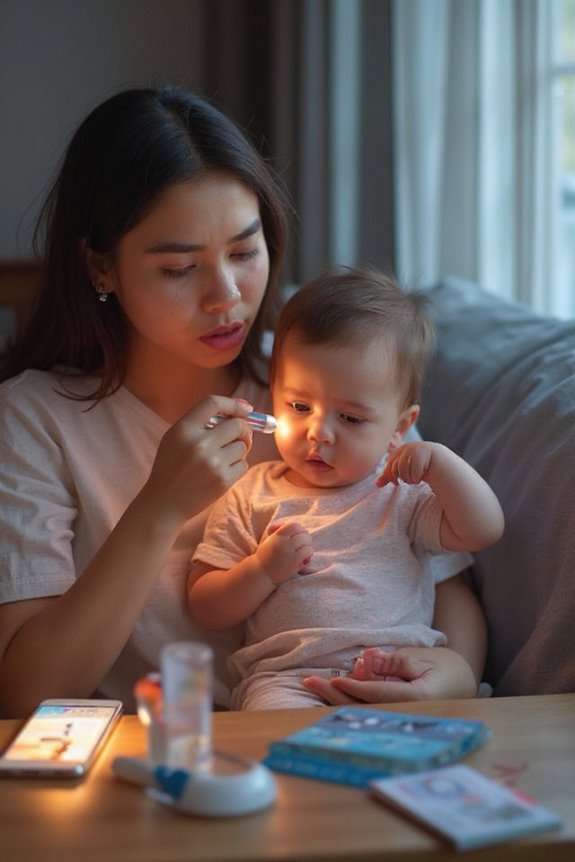
Recognizing when to seek medical attention for your baby’s throat symptoms can prevent serious complications and provide peace of mind. I recommend contacting your pediatrician immediately if:
- Your baby has a fever above 100.4°F (38°C), especially in infants under 3 months
- You notice signs of dehydration like fewer wet diapers or dry mouth
- Your baby refuses to feed or cannot swallow liquids
- There are white or yellow patches visible on the throat or tonsils
Airway concerns require urgent attention, including:
- Difficulty breathing or rapid breathing
- Blue tint to lips or nails
- Labored breathing with chest pulling in between ribs
- Unusual sleepiness or difficulty waking your baby
Don’t hesitate to seek emergency care if your baby shows severe lethargy or breathing problems.
Diagnosis Process for Suspected Strep Throat in Babies
Once you’ve contacted your pediatrician with concerns about your baby’s symptoms, the diagnostic process begins. Your doctor will perform a clinical evaluation, examining your baby’s throat, checking for fever, and evaluating swollen lymph nodes.
Due to diagnostic challenges in infants, your pediatrician may:
- Conduct a rapid strep test via throat swab
- Order a more accurate throat culture if results are inconclusive
- Consider your baby’s medical history and potential exposure
Remember that babies under 3 years rarely get strep throat and often don’t display typical symptoms, making diagnosis more complex. While rapid tests provide results within minutes, throat cultures take 2-3 days but offer greater accuracy. Your pediatrician will determine which testing approach is most appropriate based on your baby’s age and symptoms.
Treatment Options for Strep Throat in Infants
When your baby is diagnosed with strep throat, prompt treatment becomes vital to relieve symptoms and prevent complications. The primary approach involves antibiotic options like amoxicillin or penicillin, which effectively eliminate the Group A Streptococcus bacteria.
For symptom relief, I recommend:
- Maintaining hydration with frequent small feedings
- Managing fever with pediatrician-approved acetaminophen
- Ensuring a peaceful environment for ample rest
- Avoiding aspirin and benzocaine-containing throat sprays
Always complete the full antibiotic course, even if your baby improves quickly. This prevents complications like rheumatic fever and reduces the risk of recurrence.
Follow-up care is vital – schedule appointments to confirm the infection has resolved and monitor for potential complications such as ear infections or sinusitis.
Preventing the Spread of Strep Throat in Households With Babies
If your baby has been diagnosed with strep throat or another family member is infected, preventing transmission becomes your top priority. Proper hand hygiene is your first line of defense—wash with soap and water for at least 20 seconds (singing “Happy Birthday” twice works as a timer).
Avoid shared items completely:
- Never share eating utensils, cups, or food between infected and non-infected family members
- Keep baby’s pacifiers and bottles separate and thoroughly disinfected
- Designate separate towels and bedding for each person
Disinfect household surfaces regularly, especially:
- Doorknobs and faucet handles
- High chairs and changing tables
- Bathroom surfaces
Practice good respiratory etiquette by covering coughs and sneezes with tissues or your elbow—never your hands. Consider temporary isolation of symptomatic household members when possible.
Potential Complications of Untreated Strep in Young Children
Although many parents view strep throat as a common childhood illness, untreated strep infections can lead to serious complications in babies and young children. When left untreated, strep can progress beyond the throat, causing:
- Ear and sinus infections that may impact hearing
- Tonsillar abscesses requiring surgical drainage
- Kidney inflammation (post-streptococcal glomerulonephritis)
- Rheumatic fever affecting the heart, joints, and nervous system
Complication risks increase considerably with untreated infections, particularly in infants whose immune systems are still developing. The bacteria can spread to the bloodstream or develop into toxic shock syndrome in severe cases.
I’ve seen how quickly these complications can develop in young children, which is why prompt antibiotic treatment is essential when strep is diagnosed—even with mild symptoms.
Caring for a Baby With Strep Throat at Home
Once your baby has been diagnosed with strep throat, you’ll need to establish a thorough care routine at home to promote healing and prevent complications. Proper home care includes:
- Administering prescribed antibiotics exactly as directed
- Using age-appropriate pain relievers (acetaminophen for babies over 3 months, never ibuprofen under 6 months)
- Keeping your baby hydrated with breast milk, formula, or water
Effective soothing techniques include:
- Using a cool-mist humidifier in your baby’s room
- Removing nasal mucus with a gentle suction bulb
- Offering soft, easy-to-swallow foods for older infants
Maintain isolation during the contagious period and make sure everyone in the household practices good hand hygiene. Complete the full course of antibiotics, even if symptoms improve quickly.
Frequently Asked Questions
Can Breastfeeding Mothers With Strep Throat Infect Their Babies?
Yes, I can transmit strep throat to my baby through close contact, not through breast milk. I recommend continuing breastfeeding with proper precautions like handwashing to minimize strep throat transmission to your infant.
How Long Is Strep Throat Contagious in Babies After Starting Antibiotics?
I’ve seen the MIRACLE of antibiotics! Your baby’s horribly contagious strep throat symptoms transform dramatically after just 12-24 hours of treatment. I’ll tell you – they’re generally not contagious after that first day on antibiotics.
Can Babies Develop Immunity to Strep Throat?
I’ll explain that babies can develop immunity to strep throat, but their immunity development is gradual. Their bacterial defense mechanisms mature over time, which is why infants may experience multiple infections before building protection.
Are Certain Babies More at Risk for Strep Throat?
Like tiny ships in a stormy sea, certain babies face higher risk for strep throat. I’ve found those in daycares, with siblings who’ve had it, and those with weaker immune systems show greater age susceptibility to risk factors.
Can Strep Throat in Babies Cause Long-Term Throat Damage?
I don’t see evidence that strep throat causes long-term throat damage in babies. When properly treated with antibiotics, there are typically no lasting effects on throat health. Long-term complications usually involve other systems instead.

